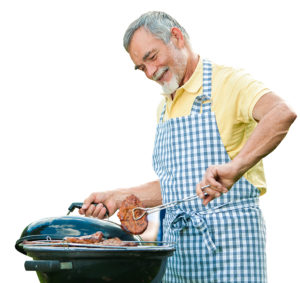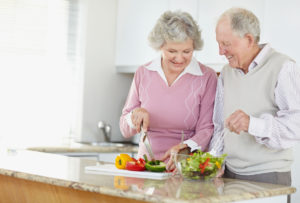Common Nutrition and Hydration Tips for Seniors
Doctors give good advice regarding eating and drinking: “Increase your hydration. Consume more protein.” But do seniors know how to make these changes in dietary habits?
Increase Hydration
Make It Happen!
You become dehydrated if you take in less fluid than your body needs. Dehydration can cause confusion, fatigue, hot or cold sensations, muscle cramping, headache, dry mouth/eyes/skin, constipation, dangerous blood pressure changes and abnormal blood chemistry (ex: blood sugar, electrolytes).
 As we age, we often have decreased sensations of thirst and hunger. In addition, some medications and age-related diseases can cause an increase in your body’s fluid needs.
As we age, we often have decreased sensations of thirst and hunger. In addition, some medications and age-related diseases can cause an increase in your body’s fluid needs.
If you are 65 or older, drink 2 liters per day, or 9 glasses (1 glass = 8 oz.) of fluid. If you have kidney or heart problems, ask your doctor for specific amounts of fluids. All liquid counts (milk, soup, coffee and tea, popsicles) and some fruits and vegetables too.
Drink one glass with each meal and one in between meals.
Keep fluid in arm’s reach throughout the day. Stash a water bottle in the car or in your bag when you leave the house.
Your urine should be light in color. If it’s darker, you are at greater risk of dehydration.
Consume More Protein
Make It Happen!
Your body needs enough protein to maintain its immune system and muscles. Without enough protein, your risk of infections, pressure sores, falls and broken bones increases.
Protein deficiency can cause problems with bruising, wound healing, dental health, fatigue and appetite. Foods high in protein usually require the ability to cook and chew which may be difficult for some seniors. However, if you eat more protein and fewer carbohydrates, you may lose some extra pounds.
How much protein should I eat?
Women should aim for 45 grams of protein per day. Men should get 60 grams. Speaking with a dietician may be helpful.
For reference, one egg white has 7 grams of protein, 1 string cheese has 8 grams, and a can of tuna or chicken has close to 40 grams.
- Breakfast tip: Cook your hot breakfast cereal with low fat milk or soy milk instead of water (+8 grams)
- Lunch Tip: Add ½ cup beans to your salad or soup (+6 grams)
- Dinner Tip: Finish the protein on your plate before starting on the fruits, vegetables, starches and dessert.
- Snack Tip: Add 1/4c of nonfat dry milk powder to your pudding or smoothie (+8 grams)
- Drink Tip: Milk, yogurt, soy milk and protein smoothies can help you reach your protein goals
Note! If you have kidney problems, ask your doctor about your protein needs.
All-Season Caregiving Tip
If your elder has reduced, or poor appetite, prepare nostalgic favorites and discuss what sounds good to him/her. Dig out old family recipes. Prepare them and make eating a memorable event. This will be fun and encourage some great conversation and socialization that helps the appetite.
If you need help with nutrition, hydration, meal preparation or caregiving, call AW Health Care: MO (314) 726-5600 or IL (618) 344-8800.
Happy 4th!
Fireworks have been part of America since its beginnings. John Adams wrote to his wife on July 3, 1776 after the Continental Congress had decided to proclaim the American colonies independent from England, “The day will be most memorable in the history of America. I am apt to believe that it will be celebrated by succeeding generations as the great anniversary festival. It ought to be solemnized with pomp and parade, bonfires and illuminations from one end of this continent to the others, from this time forward forever more.”
John Adams’ belief holds true. The American Pyrotechnics Association (APA) estimates that more than 14,000 fireworks displays light up U.S. skies each 4th of July. Take time to enjoy the fireworks, whether on TV, in your backyard or at your local community park, and join with others who commemorate the founding of our country.








Comments are closed.